#andrew Levite’s
Text


Johnny Depp photographed by Jens Koch at the 70th Berlinale (Berlin International Film Festival) World Premiere of Minamata at Friedrichstadt-Palast in Berlin, Germany (February 21st, 2020)
Re: Johnny Depp as Eugene Smith in Minamata (2020) dir. Andrew Levitas
#eugene smith#minamata#70th#berlinale#johnny depp#actor#icon#celeb#musician#iloveyoujohnnydepp#2020#2020s#2020s actors#2020s icons#2020s hollywood#2020s movies#2020s films#andrew Levite’s
4 notes
·
View notes
Text

daily aa girls: inktober edition. day 16: adrian
#adrian andrews#ace attorney#inktober#you know now I can only look at this and imagine her levitating a pizza. so.
18 notes
·
View notes
Text
honestly the fact that andrew (5’0) has choked out kevin (6’2) and punched matt (6’4) in the face is my favorite part of the whole aftg series
like dude has got to be levitating to reach their faces for a prolonged period of time. he probably had to jump to punch matt and people still take him seriously.
i love it


(first pic is andrew to matt; second is andrew to kevin)
56 notes
·
View notes
Text
when sm4 filming is about to begin and suddenly tom starts levitating in his sleep every night and in order to reverse the spell he has to recite the phrase andrew is spider-man 3 times in front of a mirror

32 notes
·
View notes
Note
I think the most pertinent, fundamental question to ask at this point is:
How canon do we want to make the 1981 musical Cats by Andrew Lloyd Webber to Better Bones?
Since you've done so fantastically well at fleshing out alternate but no-less-viable systems of belief, that door has been left wiiiide open. Stripped of the zany dance numbers and stage actors in copious makeup, you can't deny that the underlying Jellicle cat religion / Heavyside Layer wouldn't be out of place. Don't lie to us. Don't you dare.
We don't know when the musical takes place, but as for where, the Jellicle Cats and their religion are centralized in a junkyard somewhere in London. Depending on how far their area of influence extends, there could be a few cats in a sect or two of BloodClan who practice the faith of a land to the south, or otherwise believe in the existence of the Heavyside Layer. Or say, the junkyard is done away with in the late 90's and a diaspora of Jellicle Cats spreads across the land. Their descendants hope one day to make the pilgrimage for one last ball, and are invariably seen as Rather Offputting by everyone.
(In-story it'd all amount to rare sequiturs from a nameless extra or two which increase in probability the further one heads south.)
Hey bonefall hey, do you think Skyclan has a word for this? It'd be a corruption of the English "dear little [cats], of which "Jellicle" is a romanization. How would you say Jellicle with Clanmew pronunciation?
You can't run from this forever.
Stripped of the zany musical numbers and stage actors in copious makeup??? What are you, Tom Hooper?!
If you're going to put the Jellicles in the BB Universe, you fucking BETTER be taking inspiration from the cancelled 1997 Steven Spielberg animated musical adaptation which places the cats in postwar London sometime circa 1945 and implied that the cats had heavily cultural emphasis on song, dance, and performance
Which btw would place Grizabella's Jellicle Ball pretty firmly in the Code Era of my adaptation (built around the canonical tidbit that Turtle Tail was hit by a Ford Model T meaning the Dawn Era was pre-war).
It would be before the main Warrior cast is born (Except Holly due to infamous Time Travel Shenanigans)-- but Jellicles, after all, were there when the Sphinx was built, so it's safe to assume they'd still be around in the future as a cultural group.
Really the biggest barrier is that they live in bloodbourne London. Too far southeast to communicate with Clan cats or even BloodClan, who are northwest. Park Cats are from further south, but no further south than Gloucestershire at most.
So, serious answer, they can absolutely be canon in this universe, or at the very least they can be slotted in easily. I built a brand new religion system exactly to accommodate the existence of multiple cultural groups and honor the afterlives of each.
In fact, Jellicles fit perfectly into it.
They have a heaven (Heavyside Layer) but no hell, exactly the way that a "vanilla" type religion can form on its own. Really there's just one question-- what's their leader power?
Old Deuteronomy...
Is said to have lived many lives in succession (possible continual reincarnation?)
May choose the next cat to ascend to the Heavyside Layer (immediate patronification?)
But at the same time, there are some cats who seem to display magical powers, akin to the Sister's power distribution system. Mr. Mistoffelees is one, able to perform simple magical tricks. As far as I remember, there are two.
Conjuration (Ability to change the location of an object in space)
Levitation
These both seem like versions of the same power, really. It makes sense, too, that culturally they would value agility to the point of veneration. It ties into dancing, avoiding cars and dogs, stealing things.
In any case though-- you begin to lose these sorts of abilities the further you go from a group, without some kind of token. The Sisters are the example I've written so far; Tree needs some kind of item in order to see ghosts when he's not near the rest of the Sisters. The Jellicles are also a pretty proud group, I can't see them making these "tokens" for any old wanderer.
So maybe there's just a few of them, and Macavity has one stolen?
hmmmm... Maybe those reincarnations have to do with who's supposed to Hold The Token, and Old Doot has basically been one of them for eons. Maybe Mistoffelees was the most recent reincarnation from the Jellicle Ball?
Anyway TL;DR yeah Jellicle cats can exist in Better Bones, they're just too far away to interact with Clan cats.
Clanmew pronunciation of Jellicle = "Shewakl"
95 notes
·
View notes
Photo

You can make all sorts of solid arguments against a constitutional monarchy - but the point of monarchy is precisely that it is not the fruit of an argument. It is emphatically not an Enlightenment institution. It’s a primordial institution smuggled into a democratic system. It has nothing to do with merit and logic and everything to do with authority and mystery - two deeply human needs our modern world has trouble satisfying without danger.
- Andrew Sullivan
This is the genius of the British monarchy, supremacy exemplified in the late Queen Elizabeth II and now in King Charles III. Walter Bagehot was the first to really get to the heart of the matter.
Walter Bagehot, a journalist who would co-found and edit The Economist magazine was one of the greatest Victorians of the 19th century and he concerned himself with the workings and the reform of the delicate constitutional arrangements between parliament, the House of Lords, and the monarchy as so much is based on custom and unwritten practice.
Walter Bagehot published his classic work, The English Constitution in 1867 but it is the best way to understand the delicate balance of parliament and the monarchy. No one has written a finer work than Bagehot and his book remains the bible for many interested in constitutional matters regarding the monarchy.
In it he argued that the constitution was divided into two branches. The monarchy represents the “dignified” branch. Its job is to symbolise the nation through pomp and ceremony. The government - Parliament, the cabinet and the civil service - represents the “efficient” branch. Its job is to run the country by passing laws and providing public services. He was right to say that the dignified branch governs through poetry, and the efficient branch through prose.
In Bagehot’s view, a politically-inactive monarchy served the best interests of the United Kingdom; by abstaining from direct rule, the monarch levitated above the political fray of tribal politics (of left and right), and remained a respected personage to whom all subjects could look to as a guiding light. The monarch was to stay severely neutral and be apolitical. Instead the monarch was to embody in the flesh the core values of a nation.
There is a tremendous burden tied to that kind of role. When Elizabeth Windsor became queen, she was tasked as a twenty-something with a job that required her to say or do nothing that could be misconstrued, controversial, or even interestingly human - for the rest of her life. She achieved that both stoically and heroically in many people’s eyes. King Charles III has taken on that inhuman mantle now. Time will tell if he can follow the late Queen’s example.
Duty, sacrificial service, and honour....without power. That’s the role of modern royalty.
It’s hard for non-British people to understand how a monarch can come to embody the psyche of the nation. The Crown represents something from the ancient past, a logically indefensible but emotionally salient symbol of something called a nation, something that gives its members meaning and happiness. As Bagehot says, it’s an act of imagination.
Some of my non-British friends particularly can’t quite grasp this connection; to them the British royal family functions mainly at best as a different form of celebrity. But to these friends as well as those republican friends sincerely opposed to monarchy can and should grasp something else - nations and cultures need people and institutions who transcend politics, which left to itself quickly descends into tribalism or worse, authoritarianism.
#sullivan#andrew sullivan#quote#monarchy#british monarchy#king charles III#united kingdom#crown#royalty#constitutional monarchy#history#custom#heritage#tradition#queen elizabeth II#bagehot#walter bagehot#society#politics
106 notes
·
View notes
Text
CONFIRMED ATTENDEES TO QUEEN ELIZABETH II'S STATE FUNERAL:
Foreign Royalty
King Willem-Alexander and Queen Maxima 🇳🇱
Queen Beatrix 🇳🇱
King Felipe VI and Queen Letizia 🇪🇸
King Juan Carlos I and Queen Sofía 🇪🇸
Emperor Naruhito and Empress Masako 🇯🇵
King Phillipe and Queen Mathilde 🇧🇪
Grand Duke Henri and Grand Duchess Maria Theresa 🇱🇺
King Tupou VI 🇹🇴
King Carl XVI Gustaf and Queen Silvia 🇸🇪
Queen Margrethe II and Crown Prince Frederik 🇩🇰
King Harald V and Queen Sonja 🇳🇴
Prince Albert II and Princess Charlene 🇲🇨
Sheikh Tamim bin Hamad Al Thani (Emir of Qatar)🇶🇦
King Jigme Khesar and Queen Jetsun Pema 🇧🇹
Yang di-Pertuan Agong Abdullah & Raja Permaisuri Agong Tunku of Malaysia 🇲🇾
Hereditary Prince Alois & Hereditary Princess Sophie 🇱🇮
King Tūheitia Potatau Te Wherowhero VII
Sultan Haitham 🇴🇲
Sultan Hassanal 🇧🇳
Crown Prince Moulay Hassan 🇲🇦
Prince Faisal bin Turki Al Saud 🇸🇦
Sheikh Mohamed bin Zayed Al Nahyan 🇦🇪
Crown Prince Mishal Al-Ahmad Al-Jaber Al-Sabah and 🇰🇼
King Letsie III 🇱🇸
King Abdullah II and Queen Rania 🇯🇴
Crown Prince Hussein 🇯🇴
King Hamad bin Isa bin Salman Al Khalifa and Crown Prince Salman bin Hamad Al Khalifa 🇧🇭
Deposed Royalty + Distant Family Relations
Margareta (Custodian of the Crown) and Prince Radu 🇷🇴
Queen Anne-Marie 🇬🇷
Crown Prince Palovs and Crown Princess Marie Chantal 🇬🇷
Crown Prince Alexander 🇷🇸
Prince Emanuele of Savoy
Tsar Simeon II 🇧🇬
Maximilian (Margrave of Baden), Prince Bernhard and Hereditary Princess Stephanie of Baden
Prince Philipp and Princess Saskia of Hohenlohe - Langenburg
Prince Donatus (Landgrave of Hesse)
Archduke Karl of Austria
Lady Pamela Hicks
Foreign Heads of State and Governments
President Joe Biden & First Lady Jill Biden 🇺🇸
President Michael D Higgins and Taoiseach Micheál Martin 🇮🇪
President Gitanas Nausėda and First Lady Dina Nausėda 🇱🇹
President Egils Levits and First Lady Andra Levite 🇱🇻
President Andrzej Duda and First Lady Agata Kornhauser-Duda 🇵🇱
President Isaac Herzog 🇮🇱
Jair Bolsonaro 🇧🇷
President Sergio Mattarella 🇮🇹
President Marcelo Rebelo de Sousa 🇵🇹
President Yoon Suk-yeol 🇰🇷
President Paula-Mae Weekes 🇹🇹
President Frank-Walter Steinmeier 🇩🇪
President Sauli Niinistö & Mrs Jenni Haukio 🇫🇮
Prime Minister Andrew Holness 🇯🇲
Prime Minister Justin Trudeau 🇨🇦
President Ranil Wickremesinghe 🇱🇰
President Emmanuel Macron 🇫🇷
President Katalin Novák 🇭🇺
President Alexander van der Bellen and First Lady Doris Schmiedauer 🇦🇹
Prime Minister Jacinda Ardern 🇳🇿
Prime Minister Anthony Albanese 🇦🇺
Prime Minister James Marape 🇵🇬
President Cyril Ramaphosa 🇿🇦
President Hage Geingob 🇳🇦
President Zoran Milanović 🇭🇷
President George Vella 🇲🇹
Afioga Tuimalealiʻifano Vaʻaletoʻa Sualauvi II 🇼🇸
President Droupadi Murmu 🇮🇳
Prime Minister Sheikh Hasina 🇧🇩
President Alar Karis 🇪🇪
President Zuzana Čaputová 🇸🇰
Prime Minister Petr Fiala 🇨🇿
President Ignazio Cassis 🇨🇭
Prime Minister Shehbaz Sharif 🇵🇰
Prime Minister Mostafa Madbouly 🇪🇬
President Salome Zourabichvili 🇬🇪
President Ali Bongo Ondimba 🇬🇦
President William Ruto 🇰🇪
First Lady Olena Zelenska 🇺🇦
Prime Minister Luvsannamsrain Oyun-Erdene 🇲🇳
President Guðni Jóhannesson and First Lady Eliza Reid 🇮🇸
President Nicos Anastasiades 🇨🇾
Prime Minister Joseph Ngute 🇨🇲
President Halimah Yacob 🇸🇬
President Dame Sandra Mason 🇧🇧
Prime Minister Pravind Jugnauth 🇲🇺
President Ibrahim Mohamed Solih and First Lady Fazna Ahmed 🇲🇻
President Nana Akufo-Addo 🇬🇭
Prime Minister Frank Bainimarama 🇫🇯
Governmental Representatives
Marcelo Ebrard (Secretary of Foreign Affairs) 🇲🇽
High Commissioner Ralph Goodale 🇨🇦
Ambassador Igor Pokaz 🇭🇷
Vice President Wang Qishan 🇨🇳
Foreign Minister Narayan Khakda 🇳🇵
Former President Dr Joyce Banda 🇲🇼
Captains Regent Oscar Mina and Paolo Rondelli 🇸🇲
Irene Marcos 🇵🇭
Governor Generals
Governor General Sir Patrick Allen 🇯🇲
Governor General Mary Simon 🇨🇦
Governor General Dame Cindy Kiro 🇳🇿
Governor General David Hurley 🇦🇺
Governor General Sir Bob Dadae 🇵🇬
Governor General Dame Froyla Tzalam 🇧🇿
Governor General Dame Cécile La Grenade 🇬🇩
Governor General Tofiga Vaevalu Falani 🇹🇻
Governor General Sir David Vunag 🇸🇧
Governor General Dame Susan Dougan 🇻🇨
Acting Governor-General Errol Charles 🇱🇨
Governor General Sir Cornelius A. Smith 🇧🇸
Governor General Sir Rodney Williams and Lady Williams 🇦🇬
International organisations
Charles Michel (President) 🇪🇺
Ursula von der Leyen (President of European Commission)
Jens Stoltenberg (Secretary General of NATO)
Earle Courtenay Rattray (Chief of Staff to UN Secretary General)
Baroness Scotland (Secretary-General of the Commonwealth)
Sir Don McKinnon (Former Secretary-General of the Commonwealth)
Religious Leaders
Secretary of State Cardinal Pietro Parolin 🇻🇦
Foreign Minster Archbishop Paul Gallagher 🇻🇦
Maybe attending -
President Barack Obama and First Lady Michelle Obama 🇺🇸
#I'll keep updating as more confirmation comes#qeii funeral attendees#queen elizabeth ii funeral#19.09.2022#foreign royalty#heads of states
324 notes
·
View notes
Note
With their wedding less than a week away Liam still hadn't been able to convince Libby to attend and it was stressing him out. He was furiously cleaning the house to keep himself distracted. Currently, he was trying to move their large bed so that he could vacuum under it, but it was too heavy for him to budge. Without thought his magick caused the bed to float into the air and with no thought about his safety he walked underneath it to continue his vacuuming.
Andrew paused as he stepped into the foyer of their home, looking around for a moment. Something was... off. He had just returned from a busy day, finalizing a few things for the wedding, and now... he felt like he was in the twilight zone. The house was immaculate. He half expected little cartoon shimmer spots to appear. He hustled up the stairs in time to see Liam just walking underneath the levitating bed, and he reached out to take over and use his own magick to keep the bed afloat. "By all the Gods above and below, Liam. What exactly are you doing? This bed is heavy, so hurry with the vacuuming and then you can tell me why the hell you're stress cleaning."

32 notes
·
View notes
Note
William in his little vampire costume (complete with a cape, pointy ears, sharp fangs, and what you think is an enchanted gleam in his eyes that turns the irises red) slides past Wren and her date. With an excited "AHA!" as if just realizing who he saw, the prefect paddles backwards, beaming at the two girls.
"Greetings, ladies! What a majestic couple you are, I assume you are participating in ze costume contest tonight? Vell, vell, vell!" he chuckles, remembering to do what he considers to be a "vampire" accent.
"Ze competition is fierce tonight but I hope you vin! In ze general category I vill certainly be rooting for Theo and Montrose (if Andrew gets convinced to come at all). Speaking of costumes..." Will pauses ominously and then nervously glances at Imelda. He wonders if she will curse him some extra during the next Slytherin practice for what he originally planned to do with his friends. Oh, perhaps he should've caught Wren at a different time, when the Ravenclaw is alone... Too late now!
"Any chance I, a true and absolutely real vampire, can turn you into one?"


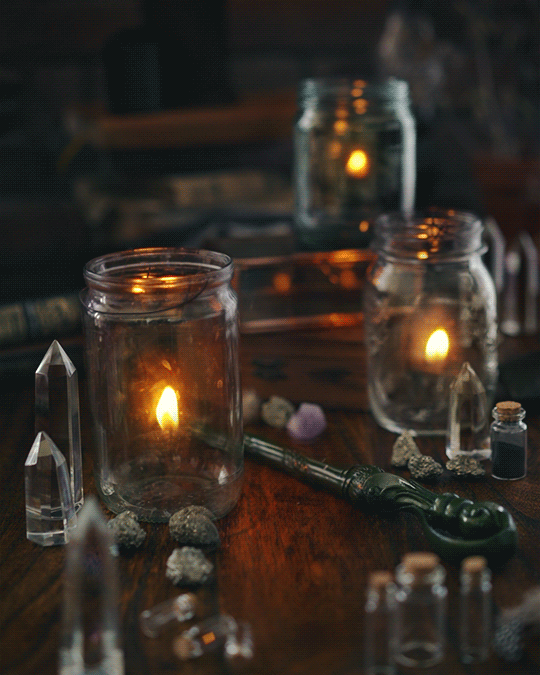
She’s never worn a dress suit before. The constricting attire isn’t the exactly the most comfortable clothing she’s owned, singularly held together by a sturdy tie coiled around her neck, closing in like a serpent with her every breath. The Ravenclaw had discarded her casual shirt and plaid vest tonight for something more presentable; not that she’s never been clad in fancy wear before, but can’t help wondering if she doesn’t look too pretentious.
She’s even tried neatening her hair, too, which Imelda’s received with mild bewilderment. (“Oh. So you do know how to use a hairbrush, after all.” The Slytherin has remarked in jest.)
Imelda has dolled up, too, clad in a very proper but heart racing ensemble: black form-fitting gown, with bell sleeves and a trailing hem in an eerie flourish. Her low ponytail let down, in a rare instance, a cascade of dark hair falling down her back. Thank the stars! Wren thinks, as tonight she is free to stare at those imperious eyes while threading her fingers through those locks without feeling like she’s being overindulgent. As much as she can pretend otherwise, Wren is perfectly aware she probably looks a tad smitten right now. She knows if the Quidditch Captain could pick, she’d choose their routinely evening flight without question. Yet Imelda is here of her own volition without much of a protest, so clearly Wren must’ve done too good of a job convincing her coming with her, as sappy or suggestive as that sounds.
They arrive at the table exhibiting varied morsels and refreshments, picking up a few of the Alihotsy-flavoured fudges and plucking the dressing with deft but messy fingers, crumbs flying in all directions.
“Mm. Come to think of it, we’ve just passed by two students and a ghost screaming at each other, a pirouetting scarecrow and a levitating niffler, but I find the most odd not one of your friends is yet to hijack any of the enchanted instruments.” Imelda grins.
Wren suppresses a smirk. “Odd, isn’t it? Not as odd as that.” She tilts her head towards a figure a few metres away. William, clad in a cloak spreading out like carefree wings, frolicking past them. Not half a second later, his little knees are shuffling as he backtracks closer with a red light of merry devilment in his eyes.
“Oh Merlin.” Wren snickers lowly. “He’s spotted us. Run, love - save yourself.”
She can hear Imelda’s scrutinising gaze before even assessing the situation. At least her girlfriend genuinely sounds entertained, especially when the prefect not-so-subtly slip into a curious new dialect. “He even sounds funny now. What did you do to him this time?”
Wren presses a hand to her chest in feigned offence. “Moi? ‘Villiam’ came up with this all by his own hand!”
A mention of the contest quickly kicks Imelda’s competitive edge into full force. Wren feels the grip tightening affectionately over her gloved hand, listening intently and can’t help but be caught up in either Imelda’s spirit in the dim light of the candles, or William’s almost childlike dedication in his role, surrounded with the scent of wood burning into fiery dust. It goes on pretty well after that, even after they catch William throwing Wren a coltish glance. His enchanted irises suddenly appear slightly redder when contrasted with his fangs that shine like pearls. It becomes clear now; the strange markings on her friends’ necks, the incessant, silvery giggling from the darkened corners, the strategic making of this ‘vampire army’ she keeps hearing about.
So she plays along.
Wren rummaged about till she whips out a hip flask she’s been carrying. “No trifling with me, ye fiend! I warn you that you do not turn me; to be your pawn for your unholy bidding, your jackal when you wish to feed!” She moves impulsively backwards, holds out a ‘protective’ arm around Imelda - who’s now staring at both of them like they’ve just grown a few extra limbs - and flicks the container, spritzing its sweetened content as if warding off a demon with holy water, into the prefect’s fanged smile.
“Don’t worry. It’s apple juice.” Wren snickers, before she laughs taking off with the incredulous Imelda in hand, into the dancing crowd, as quickly as her dress suit permits her. “You’ll never take us alive!”

12 notes
·
View notes
Text
Why You Shouldn’t Whistle In The Woods: Appalachian Creatures and Folklore
In the Appalachian mountains, small communities whisper tales of creatures that would turn a Yankee’s skin blue and run rivers up his spine. For anyone interested, here’s a list of the must-know Appalachian spooks that haunt the mountain range.
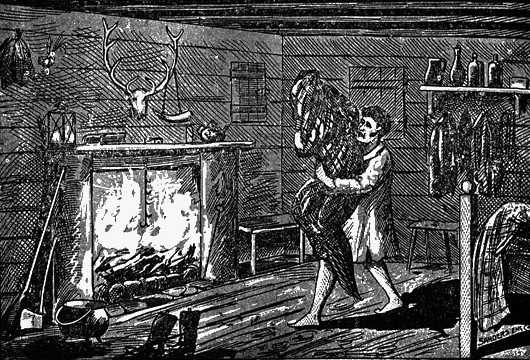
The Bell Witch
One of the most popular examples of Appalachian folklore, this story originates in Robertson County, Tennessee. The Bell Witch (thought to be a woman named Kate Batts) was cheated in a land purchase by John Bell, the patriarch of the Bell family.
Around 1817 and 1821 the hauntings began, with the Bell Witch appearing disguised as an animal (such as a bird or a black dog). She focused on John Bell’s daughter, harming the girl with painful scratches and destroying her room during the night. Bell became so concerned for the safety of his daughter that he confided in a friend, James Johnston. Word from there began to spread, until eventually it reached the ears of General Andrew Jackson.
According to the story, Jackson and his party of men set up tents outside of the Bell residence. One man claiming to have knowledge of witch dealings, stated that his silver bullets were keeping the witch subdued. As punishment for his ego and mockery, the Bell Witch set her sights on Jackson’s party and ran them from the property with violence and malice.
Even after John Bell’s (mysterious) death in 1820, the witch continued to haunt the family.
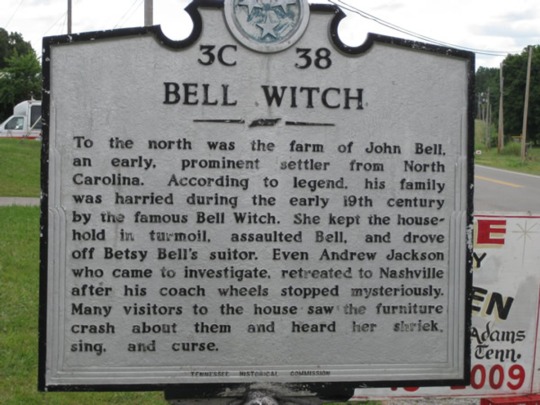
The Brown Mountain Lights
Specific to the Blue Ridge Mountains of North Carolina, these lights are a lesser known Appalachian mystery. In the Brown Mountain area near Morganton NC, locals and tourists alike have made several reports of glowing, orb-like lights hovering approximately 15 feet off the ground. First recorded sightings of these lights occurred in 1771, when engineer John William Gerard de Brahm wrote about seeing the phenomenon in his journal.
Legend tells of a gruesome battle between Catawba and Cherokee warriors on Brown Mountain, which left several dead on the battlefield. In the evenings, Catawba women would search for their sons, brothers, husbands and fathers by using torch lights to guide them. Many claim that the Brown Mountain Lights seen today are the spirits of these women, endlessly searching for their loved ones.
The Wiseman’s View Overlook, Brown Mountain Overlook, and Lost Cove Cliffs Overlook are the most popular places to see them. All are found off NC-105 S or NC-181 near Asheville and Boone. While reported sightings of the colorful lights are known for their inconsistency, the lights are typically seen at night, especially after a rainfall.

The Flatwoods Monster
Originating in Braxton County, West Virginia, The Flatwoods Monster is another population Appalachian myth. In 1952, Edward and Freddie May, Neil Nunley, and Tommy Hyer were playing at Flatwoods Elementary when a light went shooting across the sky. Arriving at the sight of the light’s crash, they saw a pulsing red light and 10-foot-tall creature with a glowing green face and gnarled hands levitating from the ground.
Little is known about what happened after this reported sighting, however an official U.S. Air Force inquiry was prompted and the incident made national news.

The Moon-Eyed People
According to both Cherokee legend and Appalachian folk tales, there is a group of humanoids lurking in the Appalachian mountains (usually associated with Murphy, NC). Described to be short with very pale skin and bearded faces, the Moon-Eyed People are known for their characteristic wide blue eyes. These creatures are said to be so visually sensitive to sunlight that they remain in hiding and nocturnal, prompting their title of “moon-eyed”.
Legend claims that local tribes waited for the full moon to appear to force the Moon-Eyed People from their underground caves. The bright light weakened them, forcing them to leave the area and hide in other parts of the Appalachian area.
Separate from other Appalachian cryptids, Moon-Eyed People were considered to be a separate race of human rather than any supernatural entities. While it may seem obvious to onlookers that said cryptids are simply European settlers, what’s shocking is that this story dates back hundreds of years before Christopher Columbus came to the continent.
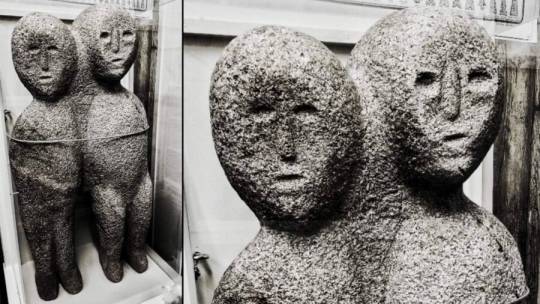
The Mothman
Famous now around the world, the Mothman is a creature who originated in Point Pleasant, West Virginia. The story begins when two couples reported seeing a large humanoid creature flying with a 10-foot wingspan and intense glowing red eyes. Stories caught and spread like wildfire, until December 1967 when the Mothman was credited for the collapse of Silver Bridge (killing 46 people).

21 notes
·
View notes
Text
ADDISON STANTZ - OC INFO

FULL NAME: Addison Louise Stantz
NICKNAME(S): Addie (by everyone)
FACECLAIM: Mary Kate Wiles
FANDOM: Ghostbusters (1984-1989; 2021-)
BIRTHDAY: November 18th, 1991
ZODIAC SIGN: Scorpio
SEXUALITY: Bisexual
GENDER: Female (she/her/hers)
OCCUPATION: Baby-sitter (age 15-18) || Intern at fertility clinic (age 18-22) || Cashier at Barnes and Noble (age 22-26) || Cardiothoracic surgeon (age 26-currently)
BIRTHPLACE: Manhattan, New York City, New York
LIVES IN: Manhattan, New York City, New York (birth-age 18, age 26-currently) || Cambridge, Massachusetts (age 18-22) || Baltimore, Maryland (age 22-26)
NATIONALITY: American
FAMILY:
Ray Stantz (father)
Willow Olson (mother)
Natalie Stantz (younger sister)
Grace Stantz (younger sister) [adoptive]
Gerald Stantz (paternal grandfather, deceased 1982)
Louisa Stantz [nee Crabtree] (paternal grandmother, deceased 1982)
Carl Stantz (paternal uncle, deceased 2021)
Sandra Stantz [nee Foa] (paternal aunt)
Justin Stantz (paternal cousin)
Zachary Stantz (paternal cousin)
Lindsay Stantz (paternal cousin)
Jean Stantz [formerly Garland] (paternal aunt)
Evangeline Garland [nee Stantz] (paternal cousin)
Maxwell "Max" Olson (maternal grandfather, deceased 2000)
Eloise Olson [nee Finnegan] (maternal grandmother, deceased 1996)
Suellen Nelson [nee Olson] (maternal aunt)
Michael Nelson (maternal uncle)
Michael Nelson, Jr. (maternal cousin)
Beau Olson (maternal uncle)
Abigail "Abbie" Olson [nee Prescott] (maternal aunt)
Margaret "Maggie" Olson (maternal cousin)
Elliot Olson (maternal cousin)
Anna Klein [nee Olson] (maternal aunt)
Quinlan Klein (maternal uncle)
Anthony Klein (maternal cousin)
Lindy Klein (maternal cousin)
Marcus Klein (maternal cousin)
Jocelyn Klein (maternal cousin)
Peter Venkman (honorary uncle)
Dana Barrett (honorary aunt)
Oscar Venkman [born Wallance, formerly Barrett] (honorary cousin)
Eliana “Elly” Venkman (honorary cousin)
Andrew Venkman (honorary cousin)
Kelly Venkman (honorary cousin)
Egon Spengler (honorary uncle, deceased 2021)
Cathleen Paige Spengler (honorary aunt)
Callie Spengler (honorary cousin)
Trevor Spengler (honorary cousin)
Phoebe Spengler (honorary cousin)
Marie Spengler (honorary cousin)
Janine Melnitz (honorary aunt)
Louis Tully (honorary uncle)
Lily Tully (honorary cousin)
MOODBOARD
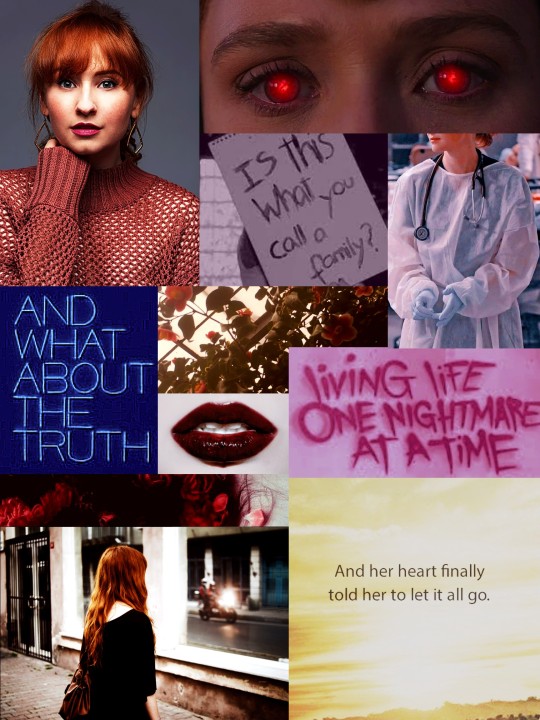
CHARACTERISTICS: Protective, steadfast, passionate, caring, empathetic, charismatic, distrusting, compassionate, rigid, intelligent, self-reliant
LIKES: Her job, her family, playing with Elly, New York City, visiting Uncle Peter and Aunt Dana in Cortland, seeing her mother perform, the holidays
DISLIKES: Her job, the Spenglers (until 2022), Bianca Jacquard, losing a patient, systemic patient neglect/medical malpractice, interns and residents, reminders of her father's past as a Ghostbuster (until 2022), riding the subway, reality television
WEAPON OF CHOICE:
Medical knowledge
Medical expertise
Surgical expertise
PKE Meter (occasionally)
Proton Pack (occasionally)
Ghost Trap (occasionally)
Gigameter (occasionally)
Telepathy (while being controlled by Ariadne)
Telekinesis (while being controlled by Ariadne)
Reality warping (while being controlled by Ariadne)
Hand-to-hand combat (while being controlled by Ariadne)
Quick reflexes (while being controlled by Ariadne)
Levitation (while being controlled by Ariadne)
OTHER PERSONAL INFO:
She received her bachelor's degree from Harvard University and attended medical school at Johns Hopkins.
She has had a crush on Oscar Barrett-Venkman since she was little, and he seems to have feelings for her, as well. There was briefly a rift between them after his fling with Bianca Jacquard resulted in a pregnancy, but she has helped him raise his daughter, Elly.
For most of her life, she held a grudge against the Spengler family for their perceived betrayal, and refused to forgive the surviving members of the family even after Gozer's return and subsequent defeat. It was only after falling under and freeing herself from Ariadne's control, as well as accidentally injuring her father, that she finally let go of her hatred.
Her best friend is Kelly Venkman, but her best friend outside of the family is her former medical school roommate and current colleague, pathologist Dr. Tabitha Rashid.
Addison is Elly Venkman's godmother.
INSPIRATION: Amelia Sheppard (Grey's Anatomy), Elizabeth Weir (Stargate: Atlantis), Catherine Chandler (Beauty and the Beast), Elizabeth Patterson (For Better or For Worse), Kim Wexler (Better Call Saul), Dana Scully (The X-Files), Hannah Asher (Chicago Med), Katrina "Kat" Van Tassel (Headless: A Sleepy Hollow Story)
NAME ANALYSIS:
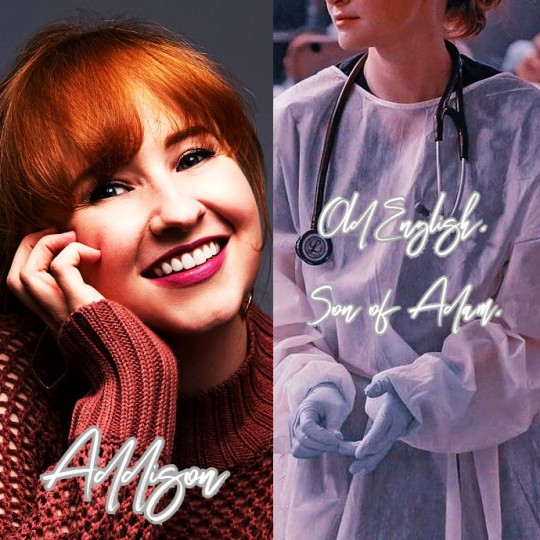

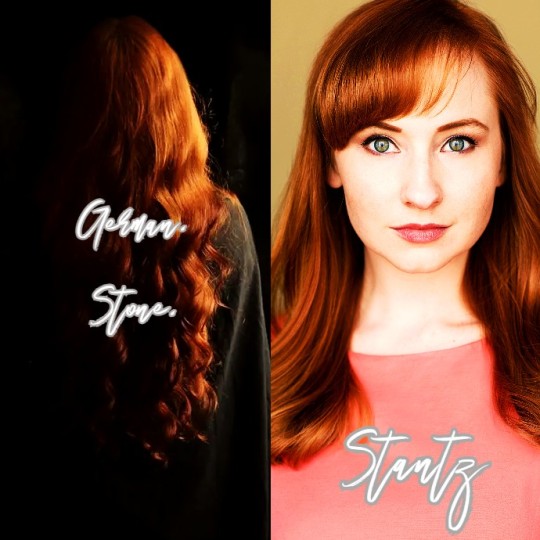
Playlist available here
#Ghostbusters#Ella's OCs#Mary Kate Wiles#Ghostbusters IDW#Ghostbusters: Afterlife#Ghostbusters: Frozen Empire#Ghostbusters 1984#Ghostbusters II#Cathleen Lives AU#Addison Stantz#OC: Addison Stantz#OC: Fix Broken Hearts
2 notes
·
View notes
Photo








Andrew Hem’s “Reviver.”
Currently on view at Ascaso Gallery in Miami, Florida is artist Andrew Hem’s astonishing solo exhibition of brilliant new works, “Reviver.”
“Known for his unearthly color aesthetic and a singular approach to portraiture, Hem weaves emotional narratives around figures inhabiting breathtaking landscapes and twilight cityscapes, employing these settings to convey states such as wonder, resilience and interconnectedness, and on the other hand, guilt, turmoil and alienation.
This body of work is a reflection on Hem’s transition into fatherhood, and the conflicts and traumas he experienced in his youth that he hopes to avert in his son’s future. In Hem’s work, levitation represents changing the path, choosing a different direction from the one society expects of us, and reflections — mirrored in the water, shimmering on shiny fabric, gleaming on wet pavement — suggest that everything that happens around us has an influence on us that can resonate onto future generations, unless we consciously sidestep the mistakes of history. Reflections also give hints about the figure’s inner life — one pair of mirrored figures has only a single reflection, another reflection meets your eye while its source remains introspective, and a third subject throws a distorted reflection, implying inner demons.
Growing up in a tough neighborhood where he and his family were the only Asians, Hem remembers feeling an overwhelming sense of isolation as a child. Since the only representation of people like himself he saw in popular culture was in anime and martial arts films, he embraces those aesthetics, but re-envisions them as an inclusive milieu where men of all races are seen as creative, thoughtful and vulnerable, and women are described not as passive aesthetic objects, but as wonderers, adventurers and warriors. Mindful that his own son never experiences that cultural isolation, Hem continually strives in his work to conjure a world that doesn’t yet exist, where no one is an outcast and everyone, no matter how different they are, is accepted.”
- Amanda Erlanson, Art Essayist.

BUY PRINTS | FOLLOW ON INSTAGRAM
133 notes
·
View notes
Text
Don’t you dare come for my man Hezekiah
A Bible study, 2022:
Then Isaiah said to Hezekiah, “Hear the word of the Lord of hosts: Behold, the days are coming, when all that is in your house, and that which your fathers have stored up till this day, shall be carried to Babylon. Nothing shall be left, says the Lord. And some of your own sons, who will come from you, whom you will father, shall be taken away, and they shall be eunuchs in the palace of the king of Babylon.” Then Hezekiah said to Isaiah, “The word of the Lord that you have spoken is good.” For he thought, “There will be peace and security in my days.”
Sophie is shaking her head. “How horrible.”
“I just don’t understand that,” Andrew says.
I do.
.
When Hezekiah was a boy, his father Ahaz offered two of his sons as burnt sacrifices to pagan gods.
Hezekiah was so young then, but the memory never left him: how he’d escaped from his nurse and run to his father. How his father’s face had been tight and unyielding, not the salvation nor even the comfort he had wanted. How his baby brothers had screamed and howled and little Hezekiah hadn’t understood.
The fire had burned until dawn.
Even all those years later, a king in his own right, bile still rose in his throat at the memory.
It was Isaiah who had comforted him later, even as he wept his own tears. “Such wickedness,” he had whispered, holding the boy close beneath his chin and rubbing circles on his back. “How can the Lord bear it?”
“What does the Lord have to do with it?” sobbed Hezekiah.
“Oh, my boy. Yahweh, the One True and Living God, has seen all that that your father does and his inner parts weep for us. You must be a better king than your father, child. You must seek to do right in the eyes of the Lord.”
“I will,” the boy promised, still trembling.
.
From then on, Hezekiah learned of Yahweh, the God of his fathers. He studied at Isaiah’s knee when he could. He read and read. Hezekiah was ravenous for the Lord.
He read of Abraham, who journeyed to a new land on the strength of a promise, and Jacob, who spent a lifetime lying and running away and still inherited God’s faithfulness, and Joseph, who forgave his brothers, and Moses, who was the most humble man in all the world, who saw God’s glory and spoke to Him like a friend. There was Joshua, who conquered Canaan on a string of miracles, and Gideon, who asked for proof, and Saul, who never wanted to be king, and David, the man after God’s own heart. Elijah, who mocked the meager fires of Baal, and Elisha, who was steadfast, and now Isaiah, who was more father to him than Ahaz could ever be, who dared to speak God’s truth, though he might at any time be killed for it.
"This is my inheritance," Hezekiah realized. "God is faithful, and so shall I be, just as my great fathers before me were."
Isaiah smiled when he heard the declaration, but he also cautioned the boy. “The Lord has revealed some of his plan to me,” he said. “He means to save a remnant, do you understand? A remnant of his people, to the glory of his name. The years before you will be full of grief, and so you must choose: to serve the Lord, in spite of the time in which he has placed you, or to turn to wickedness as your father has. This is not the age of King David, child, nor even of Solomon.”
“I don’t understand,” Hezekiah said.
“Have faith,” replied Isaiah with a smile and a sigh. “Yahweh is more gracious than either of us knows.”
Hezekiah’s father defiled the temple and not one of the Levites dared to stop him. He pilfered its treasures and gave them to the king of Assyria in tribute. He built pagan altars in the holy places. He barred the temple doors, that none might enter.
You evil, evil man, his son thought.
.
When at last he became King of Judah, Hezekiah’s first act was to fling open the doors of the temple. In the first year of his reign, in the first month, he had them repaired and restored, and as much of the destruction un-done as could be managed.
He ordered the Levites to consecrate themselves anew: yes, even those who had not stopped his father. “It is in my heart to make a covenant with Yahweh, the God of Israel,” he told them.
Hezekiah’s courtiers were the same flattering, conciliatory men who had served his father. “I am going to cut down the Asherah,” he told them. “I am going to break Nehushtan and smash the pillars and I am going to tear down the high places.”
“My king,” one man said, “I understand that you want to serve Yahweh, but the people are of a different mind.”
Another man, dripping with rubies, bowed low and added, “Surely, you must see sense. None of your forebearers have ever troubled the high places. People worship there as you do at the temple, and it will not do to upset them. You must break the pillars and take down Asherah and be satisfied.”
“No,” said Hezekiah, with more bronze in his spine than most swords. “The high places.”
Within a week, the high places were gone.
.
When Assyria came for Israel, the people of Judah clamored to have the high places back. Hezekiah stood firm, and waited to see whether Assyria would destroy Judah next. “Lord have mercy on us,” he whispered, knowing that his own father had made bargains with Assyria, knowing that God’s wrath against His people was just. “Oh, holy God, have mercy. Spare us a little longer.”
Assyria arrived at Judah’s gates, just as everyone had known they would, and the king called Hezekiah out to meet him.
He was vile and foul-mouthed, the king of Assyria, but his army was a towering wave bearing down on Judah. He laughed at the notion of salvation from the Lord. Had any other nation’s gods ever saved them from Assyria? He called Hezekiah a liar and worse.
Hope was a guttering torch, but it was still bright against the shadow of death. After he had put on sackcloth and ashes, Hezekiah sent messengers to Isaiah. “Do not worry about my mettle,” he said, with more assurance than he truly felt. “I rely on Yahweh.”
It was a strange message for Isaiah to receive. No king had ever sent him anything like it before.
Hezekiah journeyed to the temple. He stepped inside and breathed deep, inhaling the incense and smoke of the place. Oh, Lord, he prayed, Oh God of Israel. Enthroned above the cherubim. You are the God. You alone. It was the very cry of his heart.
Judah was not what it once was, but it was not yet a ruin of itself. Help us please, prayed the king. Save us. Let all the world see your glory. Don’t let us be destroyed. Not yet. Not yet.
When he returned to the palace, Hezekiah found Isaiah’s reply waiting. God had heard his prayer. Judah would stand, for now.
Trembling with relief, Hezekiah fell to his knees, the gratitude and exhaustion almost too much to bear.
That very night, one hundred and eighty-five thousand Assyrians died in their camps. “An angel of the Lord,” breathed the king, thinking of Joshua.
.
While Hezekiah was still in the prime of his years, he became ill. Sweats and dizziness, boils and sores, and all manner of misery. The court physician put on a hopeful face, but when Isaiah appeared, Hezekiah knew what awaited him.
How awful that Isaiah, who had been as a friend and a father to him, should now only signify dire news with his appearance. The price of kingship, Hezekiah thought. One of many.
Isaiah knelt down and spoke gently, but the authority in his voice was yet sharp and unyielding. “Thus says Yahweh: ‘Set your house in order, for you shall die.’”
Hezekiah’s heart seized, though the words were not unexpected. Oh Lord, not yet, he thought up to heaven. Haven’t I walked before you in faithfulness? Haven’t I served you with my whole heart?
Scarcely ten minutes later, Isaiah returned to the sickroom. He knelt again beside the king and spoke his name. “Hezekiah.”
And again, there was hope. The barest dregs of hope, perhaps, but fierce and strong in the bottom of his cup. Hezekiah looked up.
“Thus says Yahweh, the God of David, your father: ‘I have heard your prayer and I have seen your tears. I will heal you. You shall not die yet.”
Just like Judah, Hezekiah was saved. For now, at least. God promised fifteen years, and no more.
When Isaiah offered him a sign, Hezekiah thought of Gideon. “Shall the shadow go back ten steps or lengthen ten steps?”
It was no kindness for the shadow to lengthen. It only brought one closer to the inevitable, to the doom that had been staved off for now but which must be met eventually. “Let the shadows go back,” the king said, and they did. The Lord drew the shadow back ten steps, right across the steps of Ahaz.
.
And so, we come at last to the part where Hezekiah failed. Envoys from Babylon came, and Hezekiah showed them his treasure house. “There is nothing in all my storehouses that I did not show them,” he told Isaiah. He was an old king now, having reigned well and collected many treasures. He did not think much of showing them off.
Isaiah looked at the king he loved and spoke the bitter word of God. “Hear the word of Yahweh,” he said, and he saw the color drain from Hezekiah’s face. “The days are coming when all that is in your house will be carried off to Babylon. Nothing will be left. Some of your own descendants not yet born will become slaves to the king of Babylon.”
Hezekiah sank down, but when he looked up at Isaiah he was smiling. “The word of Yahweh is good,” he said. “I am glad.”
There it is, dear reader. I hope you can forgive him for it.
Oh thank God, Hezekiah was thinking, not yet. Babylon will come, but not yet.
Even the strongest of spines will weaken over the years one spends as king. King of a failing, unfaithful people, no less. What a heavy thing. Hezekiah was tired, even if he had not yielded to it until now. He was grateful for the reprieve, just as he had been the last time God had granted it to him, and the time before that.
Hezekiah had done his duty to Judah; he had done more than his duty. He had failed God’s measure, of course, but who does not? Can you say that you would not have been as tired as he was, when the word of judgment finally came?
.
Isaiah spoke God’s judgment with the grief of a prophet. He wept for Judah. The prophets were so often called to weep God’s tears.
“I do not understand why you are weeping,” Hezekiah told him. “Is this not good news?”
Isaiah looked at the king and saw the little boy weeping for his baby brothers after they had passed into the fire. “It will come to grief,” he said. “Your sons, Hezekiah. The children of your line will die.”
“But not now? Not yet?”
“No. Not for a hundred years. You will sleep with your fathers long before it comes.”
“And you would have me weep for that?”
“Is it not worth weeping for?”
And Hezekiah did not have an answer. Only this: I cannot weep now. All my tears are gone. The bronze in my spine is all used up.
.
[Hezekiah] trusted in the LORD, the God of Israel, so that there was none like him among all the kings of Judah after him, nor among those who were before him. For he held fast to the LORD. He did not depart from following him, but kept the commandments that the LORD commanded Moses.
.
And Hezekiah slept with his fathers, and Manasseh his son reigned in his place.
#i wrote this in a fugue state after small group a couple of weeks ago#far and away the fastest i've ever written one of these Bible pieces#as ever virtually no extra research went into this so if any of the historical/cultural details are off that's on me gang#Bible humans#leah stories#pontifications and creations
38 notes
·
View notes
Text
A Dustland Fairytale (1/12)
Read on AO3 | tagging @today-in-fic
Chapter 1: The Starting Line
The castle was stunning – teeming with life. She could see why Missy had come here; she always cared about the ‘energy’ of a place, or the aura, or something. Scully was more focused on tangible things, like whether everyone wanted her dead.
It was, admittedly, odd for her – a magic user – to come looking for sanctuary in Camelot, but after the…incident back home, she didn’t have much of a choice. The only place her mother could think of to send her was Camelot, where she might find a home with an old family friend, Walter Skinner, and pursue her dream of becoming a physician under his guidance.
There were, of course, two tiny issues with this plan: first off, magic was banned in Camelot – and Scully practically breathed magic. She knew her magic was made to heal, and sometimes it got a little over-eager. That was how she’d gotten herself into trouble in Ealdor – a few bones set or aches eased could be explained away easily enough: the townspeople knew she read every apothecary’s book she could get her hands on. But then she’d seen the little Turner boy – being born blind was a death sentence in a farming town like theirs – and her heart just broke. She so wanted him to be healthy and safe that her magic let loose. She had no idea how she did it – no idea if she could do it again – but everyone saw the light leave her and wrap itself around the babe like a blanket. When the light faded, the boy’s eyes opened, blue and bright where they had been glassy and…well, Scully didn’t get to see what happened next because she’d been tackled to the floor by Farmer Andrews screaming bloody murder.
Her parents had managed to talk the villagers down from handing her over to King Cenred, but only on the condition that she’d stay far away. And though she was sad to say goodbye to her family, she’d always yearned for more – more than collecting the eggs every morning; more than sitting around waiting until some farmer ten years her senior decided she was good enough to marry; more than a woman in a small village could ever hope for.
That led on to the second tiny problem. She was a woman, and this world was not kind to women. She did not believe what her brother Bill said, that women were made to stay at home, to look after children and mend socks. Nor did she subscribe to her father’s belief, that she had a man’s mind in the body of a woman. Women were just as capable as men of being great thinkers, great fighters, and great leaders. But that didn’t change the fact that it wasn’t safe for a woman to travel alone, or that nobody would agree to train a woman to be a physician.
So, in true Scully fashion, she combined her two problems to come up with a solution: she’d use her magic to disguise herself as a man – that should be enough to get her safely to Camelot, and there she’d convince Skinner to take her on as an apprentice and do her best to hide her magic.
That might, she thought as she looked between her outstretched hand and the man levitating six feet above the ground, be easier said than done.
~~~
She hadn’t meant to startle the man, but when she’d entered the apothecary, she hadn’t even realised anyone was in there. Scully was looking around curiously – or, rather, nosily. She’d never seen so many instruments or strange plants, and she’d been leaning over to get a closer look at an oddly shaped vial over the fire when she’d knocked into a chair. There was a loud scraping sound, followed by a shout of surprise, and then a man she hadn’t spotted before was falling backwards from the top of a ladder – and she’d flung her arm out without a moment’s hesitation to stop his fall.
She lowered him to the ground carefully, and he turned to look at her, eyes wide with surprise. He was bald, a little younger than her mother perhaps, and his expression of shock was already morphing into one of exasperation. Yes, this must be Skinner.
“Er…I apologise, sir. I didn’t mean to startle you,” Scully tried after a long moment.
The man stared at her in disbelief. “What in the name of the gods were you thinking, boy? Don’t you know sorcery is punishable by death in Camelot? They executed a boy your age just this morning for conjuring a flower for a girl. If anyone had seen you-”
“Nobody saw me except for you, sir, and my mother has sent me to you because she remembers you as a friend to magic.”
Skinner rubbed his forehead. “I will not turn you in, since you may well have saved my life, but there are no friends to magic in Camelot – or if there are, they don’t live long. Do I make myself clear?”
Scully nodded.
“Your mother sent you to me? Why?”
“I want to train to be a physician, sir. I’ve learnt the basics: wound dressing, collecting herbs, a few poultices…but I’d like to learn it all. Anything you can teach me.”
Skinner squinted at her. “What’s your name, child?”
“Scully, sir. My mother is Margaret and my father is William.”
“Scully is the family name. What is your given name?”
Scully shifted uncomfortably under his scrutiny. “Danyl, sir.”
“Lying does not make for a good first impression, boy. Margaret and William have two sons: one named for his father, and one for his uncle, who is my brother by marriage. Neither, I imagine I need not tell you, is named Danyl. So who are you really?”
Scully sighed; this was not going particularly well. She dropped the glamour and heard Skinner’s sharp intake of breath. “Dana, sir. I am their youngest daughter. But please, sir, I know I’ll make a good physician – I’m a fast learner and a hard worker.”
She saw his expression soften a little. “You’ll not cause me any trouble? I get enough of that from the prince.”
She nodded eagerly.
“Fine. I’ll clear out the storage room for you to sleep in, and in the meantime, you can make yourself useful. Take this. It’s a sleeping draught for the princess; I’ll show you how to make it later. Go down the steps, across the courtyard, and up the stairs directly opposite. And no trouble. Understand?”
“Down the steps, across the courtyard, up again. Got it.”
~~~
Scully made it at least twenty paces out of the apothecary before finding trouble, and she figured she should get some credit for that.
But as she stepped out into the courtyard, she heard a cry of distress. It came from a boy cowering behind a shield, running along one side of the square as a group of knights jeered at him. One of them was throwing daggers at the shield; his aim was good, Scully could admit, but it was an absurdly dangerous game, and the poor boy was shaking. She strode over and stood in front of him, glaring at the knights.
“You’ve had your fun; leave the boy alone.”
The knight who had been throwing the daggers walked over to stand in front of her, laughing. She felt the anger rising in her chest – she couldn’t stand bullies. The man was tall; Scully suspected that he was one of those men who used his size to intimidate others. Well, she wouldn’t be intimidated.
“We were only having fun,” the man said, grinning obnoxiously.
“I don’t think he was having fun,” Scully replied, jerking her head at the boy behind her.
“C’mon, they’re only training daggers! They’re not sharp enough to hurt anyone, are they, Tommy?” he sneered at the boy, who Scully could now see was actually a man – older than her, certainly.
The man, Tommy presumably, mumbled something under his breath and scurried away. Well, a thank you would have been nice.
Scully turned her glare back to the man in front of her. “Training daggers or not, you could have hurt him. Grow up.”
The man looked down at her sardonically and said, “That’s rich, coming from you.”
Scully stepped closer, returning his stare. “Only a small man uses his size to intimidate. Besides, I dare say I could take you down a peg.”
The man leaned in and whispered conspiratorially, “I could have you in the stocks for that.”
Scully scoffed. She may not have been from these parts, but even she knew that squires didn’t have that sort of sway, no matter how highly they thought of themselves. “Who do you think you are, the king?”
The man grinned. “No, I’m the prince. Mulder.” He stuck out his hand, as if they were making polite introductions.
Now, there were two sides to Dana Scully. One was a woman who followed the rules – didn’t like people who broke the rules – who did as she was told, and who bowed to authority (at least, when she believed in the integrity of that authority). She was a logical young woman, and she saw the logic in keeping out of trouble. But she hadn’t yet grown out of the righteous fire of adolescence, and she had another side to her: a reckless side. It’s what had led her, more than once, to do something she shouldn’t on a dare from one of her brothers. It’s what led her to stand up for this squire, when it would have been wiser to avert her eyes.
As she stood in front of the prince, staring at his proffered hand, the two sides of her were at odds. She knew, logically, that he could well have her put in the stocks for what she’d said. She knew, logically, that her best bet was to apologise. She knew, logically, that rejecting a handshake from a prince was not a good start to her career in his court.
But her whole spirit rebelled against it. This man was grinning – laughing at her – and, prince or no, he’d been tormenting a boy barely out of the schoolroom.
She put her hands on her hips, glared up at him, and said, “Respect is not a birth right, and I do not shake the hands of men I do not respect.”
Two of the knights who’d been egging the prince on made to grab her, but the prince waved them off, still with that infuriating smile on his face.
“No, no, let the boy go. I’ve rather enjoyed not being respected. It’s always educational to experience something new.” He winked and led the knights away, leaving her flushed with anger.
~~~
Scully was still fuming by the time she reached the royal quarters. She wondered if the princess would be as arrogant as her brother – though she was starting to worry she’d never find out. There had to be thirty rooms in the royal quarters, which were build like a maze besides, and Skinner had given no indication of which belonged to the princess.
She caught sight of a blond head, barely visible behind a pile of sheets.
“Excuse me!” she called out.
The boy blinked and scurried over. He reminded Scully of a puppy, somehow – over-eager and panting a little.
“Hello, I’m new to Camelot, and I’m looking for the princess’ chambers. I have something for her from the court physician.”
The boy smiled. “Of course, I’ll take you there. My name’s Pendrell, by the way. I’m the king’s manservant. If you need any help settling in, or, or, directions around the castle, I’m your boy – man!”
Scully smiled and followed him down the corridor. “Thank you, Pendrell, that’s very kind of you. I’m Scully; I’m training to be the physician’s assistant.”
Pendrell chattered on eagerly, and seemed almost disappointed when they reached the princess’ chambers. “Here you are, then. I hope I’ll see you around soon.”
Scully gave him a wave, which he tried to return before remembering that he was carrying a load of laundry.
She looked at the princess’ door and sighed. Frankly, she’d had enough of stuck-up nobles for the day. She’d never been one to cower from a task that needed doing, though, so she stepped up and knocked firmly.
“Enter.”
She did so, and looked around the room in awe. She’d never seen a bed so large, or so many fine things in one place: books, candles, jewellery, beautiful dresses, a maid arranging flowers by the window. And standing in a shaft of sunlight, as handsome as any of her fine things, was the princess. She had a pretty face and a kindly smile which put Scully at ease immediately.
She curtsied. “My lady, I have a tincture for you from the court physician.”
“Danes?” Was that-?
The maid in the corner span around – and, yes, it really was her! Missy, in the princess’ chambers, wearing a maidservant’s dress far finer than anything either of them had worn back home.
“Missy!” Scully forgot the princess entirely as she wrapped her arms around her sister. She clung on desperately, feeling Missy’s tears on her shoulder.
“Aren’t you going to introduce me, Melissa?” Scully jumped back at the princess’ voice.
“Oh, I’m so sorry, my lady. Here,” Scully said quickly, handing over the tincture. She’d only left Skinner’s quarters three candle-marks ago and she’d already made a scene in front of two royals. This was probably not what he meant when he told her to stay out of trouble.
Missy brushed a tear from her eye and said, “Oh no, it’s my fault – only I was so surprised to see you. Samantha, this is my-” she cut herself off, looking at Scully’s apparel uncertainly. Of course – Missy could see through the glamour, but she was still dressed in Charlie’s tunic and slacks.
“I am Melissa’s brother, my lady. My name is Scully, and I’m training under Skinner to be a physician.”
The princess looked over at Missy with an affectionate smile. “Well, any relation of Melissa’s must be a friend of mine. She’s an angel, as I’m sure you know. I must go and speak to my father, but please make yourself at home here, Scully. I’m sure the two of you have lots of catching up to do."
Scully curtsied as she swept out of the room, and then Missy’s arms were around her again.
“Oh, Danes, you have no idea how much I’ve missed you. But what are you doing here? Why are you pretending to be a boy?”
Scully told her tale – from healing the Turner boy to seeking out Skinner – but when she got to her run-in with that awful prince, Melissa only laughed fondly.
“This squire, was he brown-haired, broad? A little thuggish?”
“How did you know?”
“His name’s Tom. He’s Sir Colton’s son, and he’s a real piece of work. Mulder saw him hassling me this morning – telling me how good he is with his sword – ugh. You know the type. The other maids and I are used to that sort of thing – there’s nothing we can do. But the prince always puts them in their place. He makes sure they know they’ll pay, even if the king wouldn’t do anything.”
Scully had to begrudgingly admit that the prince might not be all that bad.
Missy grinned. “And he’s cute too, don’t you think?”
Scully sniffed. “I didn’t notice. I was distracted by his arrogance. His sister is much nicer. Prettier, too.”
“Oh, she’s not his sister. She is very pretty, though.”
“She’s not? I thought she was the princess.”
“Well, she is. Her father’s the king. He married Prince Mulder’s mother after the last king died, maybe ten years ago now.”
“So which one of them will take the throne when their parents die?”
“Samantha. It’s a strange story, actually. Back when Mulder’s parents were king and queen, they tried for years to have a child, but couldn’t. Spender was royal advisor back then, and a close friend of the king, so they agreed to name his daughter heir. Samantha was only two years old then. But almost as soon as she was named crown princess, the queen found out she was pregnant. Of course, it was too late to reverse the process, so they couldn’t have their son as heir.
“Is he bitter? Prince Mulder, I mean?”
“No, I think he’s glad, really. Court politics wouldn’t suit him at all. Mulder is…not like the princess. He’s too fiery to sit on a throne and mediate land disputes all day long. Mulder’s always running off on some odd quest or other – it drives the king mad.”
“Does he get along with the princess?”
“Oh, yes. They’ve always been close – partners in crime. Like Charlie and me.”
“Perhaps they’ll marry, then. The whole heir business wouldn’t matter in that case.”
Missy looked thoroughly put off by the idea. “Oh no, I don’t think so. They’re practically siblings. No, I hope not. I hope not.” She was emphatic, and Scully wondered if her sister might have a personal interest in the question. She had called Mulder cute, after all. Well, prince or no, Scully would kill him if he messed Missy around. Or castrate him, at the very least.
“Enough about these nobles. How did you end up here? Last I heard, you were living with Ellen out in the lower town selling charms. Look, I’ve kept mine all these years,” she said, pulling it out from under the collar of her tunic.
Missy smiled. “Now, I know you don’t believe in destiny, Danes, but that’s the only explanation. Ellen had just had her baby, and coin was short, so I said I’d bring my charms to the citadel where some wealthy merchants would be sure to buy some for their wives and mistresses. But along the way I was attacked by bandits – they didn’t hurt me, but they took all my charms – months of work. I couldn’t go back to Ellen empty-handed, and give her another mouth to feed. I was totally distraught, thinking I’d have to get back to Ealdor, somehow, when the princess came across me crying. I had no idea who she was, but she had the sweetest aura I’d ever seen, and I told her everything. She said it would be alright, took me by the hand, and brought me to the castle. She let me sleep on the pallet in her antechamber, and in the morning she told me she’d spoken to the queen, and I could be her maidservant if I liked. I’ve been here ever since, and I’ve never had a cruel word from her, or from the prince.”
Scully looked at her shrewdly. “But you have from the other nobles? The king and queen?”
“The queen is…not a cruel woman, but she is cold. She chooses not to see how her people suffer under the rule of her husband. Her own son, even. But, Dana,” here, she lowered her voice, “The king is a bad man. Ruthless. He will kill you if he discovers your…talents. You cannot be safe here. Are you sure this is what you want?”
“I’m sure, Missy. And I’ve always wanted to be a physician: now I can. Wouldn’t you call that destiny?”
Missy smiled, a little teary-eyed. “Oh, well you’re still my baby sister. I’m glad I can at least look out for you here. Why don’t you come with me to the feast tonight, and I’ll tell you who everyone is, and who to avoid.”
~~~
That was how Scully found herself standing rather awkwardly against the wall of Camelot’s banquet hall. If she’d ever taken the trouble to imagine what a feast fit for nobles would look like, which she hadn’t, she would have been pretty close: enormous piles of food, freely flowing ale, ruddy-cheeked lords pinching at panicked serving girls – Camelot had it all.
The only aspect that didn’t quite fit her vision was a travelling bard, welcomed as a special guest by King Spender. Scully had imagined bards to be young, energetic and spritely men – surely the job demanded such – but this bard was greying and tired-looking. His song was slow and soporific, and Scully found herself leaning more and more heavily against the wall.
And then she realised she wasn’t the only one: there was Prince Mulder, struggling to keep his eyes open, and Skinner resting his head on a hand, and Missy falling against the princess’ shoulder. Scully clamped her hands against her ears the second she realised what was happening. This was bad. The entire court of Camelot was drifting to sleep before her eyes. She had to stop that song.
She looked over at the bard, who was staring right at her. The first thing she noticed was his sad, sad eyes. He stopped his song and the silence in the hall was suffocating.
“You must be Scully,” the man said slowly.
Scully stared at him. “How do you know my name?”
He smiled sadly. “I’m sorry to cut your destiny short, child.”
At the front of the hall, the royal family were blinking awake. The king was muttering something about magic and the dungeons. Scully took a step closer to them, though she had no idea what the bard intended, or what he meant by her destiny.
The bard moved to the centre of the room, followed by a whirlwind of tablecloths and papers. “King Spender, you are a tyrant and a madman. You sentence men, women and children to death with a wave of your hand, but no understanding of what death means. I will teach you what death means.”
King Spender stood and slammed his hands on the table. “Guards! Arrest him!”
The bard flicked his hand and the guards struggled against invisible restraints. “You cannot hurt me more than you already have, you foolish man. You killed my son. My only child. Do you remember his crime?”
Spender twisted his mouth distastefully. “If I had him killed, he must have been a magic-user. All magic-users are corrupt. He deserved to die, just like you.”
The bard laughed hollowly. “He had no magic. He pulled a flower from his sleeve – a sleight of hand, to impress his sweetheart. One of your knights saw and cried magic because you have created an empire of fear and mistrust. But your empire is built on legs of sand and I will bring them down. A life for a life. A son for a son.”
It all happened so quickly. Barely a second, in which the future hung in the balance: Scully saw the flash of silver as the bard plucked a carving knife from the air whipping around his head, and before she knew what she was about, she was diving across the hall to knock Prince Mulder flat. As they hit the floor, she heard the impact of the knife burying itself in the wall behind the prince’s chair.
She looked down into the prince’s wide eyes, an inch below her own, and for one moment – despite herself, despite everything she believed in, and everything she didn’t – she saw her destiny in his eyes. And then she heard the bard being tackled to the floor and remembered herself; she rolled off Prince Mulder’s body and scrambled to her feet.
The hall was in chaos. Lords and ladies were clinging to one another, the king was yelling, and the bard had been knocked out on the floor. The uproar only subsided when the guards dragged the bard out of the hall.
The king looked over at her, eyes narrowed and mouth twisted. She tried not to flinch. “You saved the prince’s life,” he stated.
Scully glanced over at Skinner, unsure if she was expected to respond.
“This warrants a reward,” he declared in the same imperious tone. “You are trustworthy, I suppose.”
Scully opened her mouth but couldn’t think of what to say. Skinner replied for her: “The boy is trustworthy, sire. I can vouch for him; he’s my nephew.”
She’d won Skinner’s loyalty, at least, if he was willing to lie for her.
“Then you will be rewarded with a position in the royal household. You will be Prince Mulder’s manservant.”
Scully and Mulder had matching expressions of horrified disbelief.
“Sire,” said Mulder stiffly, “I have no need of a manservant.”
The king waved his hand dismissively. “You are a prince, and it’s time you started acting like one. You will have a manservant.”
Mulder clenched his jaw but said nothing.
Scully looked over at Skinner, who only shook his head.
The remainder of the meal was strange, to say the least: the king announced that the sorcerer would be executed the following day, which was followed by raucous applause, as if a grieving father’s death were a cause for celebration. Mulder and Samantha, to their credit, sat through it stone-faced – though in the prince’s case, that could have been lingering moodiness from the dreadful affliction of being given a personal servant. The life of a prince must truly be a trial.
As for her, Scully stood by Missy’s side in silence, wondering how on earth she was going to survive as manservant to the prince of Camelot. Beyond the fact that she knew nothing about serving, she couldn’t exactly keep a low profile, tending to the whims of a royal. And Prince Mulder, whatever his faults may be, did not seem to be a stupid man – how long could it possibly be until he figured out she was a woman – or, worse, a magic-user? Yes, she’d be the next execution ordered and these pot-bellied, wine-addled nobles would cheer her away to the pyre.
It was with that comforting thought that she drifted off to sleep on her first – and perhaps last – night in Camelot.
12 notes
·
View notes
Text
And so that ancient “taboo against contact with supernatural forces are with us still,” parapsychologist George Hansen observes with respect to the academy, “though in veiled form.” This should not surprise us, Hansen goes on to suggest, for although taboos have always been violated “in order to release magical power,” there is a real cost for such transgressive acts. “Society would be partly deconstructed in the process.” Hence the taboo, still very much in place in the academy, against any serious engagement with the paranormal.
Anthropologically speaking, however, “releasing magical power” is very much akin to “being culturally creative,” so it is perhaps not too surprising to find, once again, some of the strongest occult interests in a founding thinker, which are then later denied, actively demonized, or just politely overlooked.
From his youth, the Romanian historian of religions Mircea Eliade was deeply interested in esoteric thinkers and occult matters. This is already patently obvious in his “Folklore as an Instrument of Knowledge,” an early essay (1937) in which he argues, more or less exactly like Andrew Lang had done, for the empirical or experiential reality of folkloric beliefs and psychical phenomena.
Behind at least some of these “miraculous” stories, Eliade argued, lays a series of actual concrete human experiences, which are then exaggerated and mythologized by the religious imagination. Eliade thus explores the critical literature on such things as levitation in Catholic hagiography and Indian yoga and the “fluid” link said to exist between an object and its previous owner assumed in various magical rituals and psychical practices (hence “contagious magic,” the magical use of relics, and “psychometry” or the psychical perception of persons via their possessions).
As a way of concluding the essay, Eliade takes the historicists to task for claiming faithfulness to the historical documents, until of course these documents violate their own positivistic and materialistic worldviews. Then they simply ignore them or brush their data aside as “primitive,” “mistaken,” and so on. Now the dismissing word in vogue is “anecdotal.”
It appears that Eliade’s convictions here flowed out of his own personal experience of such matters and date back to around 1928, when, “as a student, I went to study Yoga and Tantra with S. N. Dasgupta at Calcutta University,” he tells us in an essay on “The Occult and the Modern World.” As he once explained in another context, these dissertation researches and early experiments with yoga taught him “the reality of experiences that cause us to ‘step out of time’ and ‘out of space.’”
Since he doubted that he would be able to describe in “scientific prose” the nature of such experiences, he would later “camouflage” them in his literary writings, and particularly in the novella The Secret of Doctor Honigberger, which he explicitly identifies as a species of littérature fantastique. Eliade explains all of this in his interview with Claude-Henri Roquet:
In describing Zerlendi’s Yoga exercises in The Secret of Doctor Honigberger, I included certain pieces of information, drawn from my own experiences, that I omitted from my books on Yoga. At the same time, however, I added other, inaccurate touches, precisely in order to camouflage the true data. . . . [The reader] would then be led to conclude that all the rest is invented—imaginary—too, which isn’t the case.
-- Jeffrey J. Kripal, Authors of the Impossible: The Paranormal and the Sacred
8 notes
·
View notes
Photo
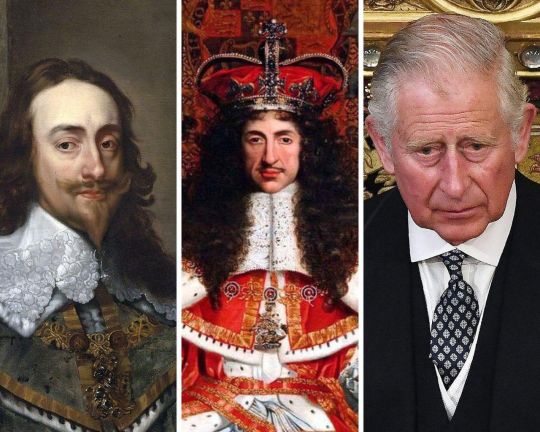
You can make all sorts of solid arguments against a constitutional monarchy - but the point of monarchy is precisely that it is not the fruit of an argument. It is emphatically not an Enlightenment institution. It’s a primordial institution smuggled into a democratic system. It has nothing to do with merit and logic and everything to do with authority and mystery - two deeply human needs our modern world has trouble satisfying without danger.
- Andrew Sullivan
This is the genius of the British monarchy, supremacy exemplified in Elizabeth II and King Charles III. Walter Bagehot was the first to really get to the heart of the matter.
Walter Bagehot, a journalist who would co-found and edit The Economist magazine was one of the greatest Victorians of the 19th Century and he concerned himself with the workings and the reform of the delicate constitutional arrangements between parliament, the House of Lords, and the monarchy as so much is based on custom and unwritten practice.
Walter Bagehot published his classic work, The English Constitution in 1867 but it is the best way to understand the delicate balance of parliament and the monarchy. No one has written a finer work than Bagehot and his book remains the bible for many interested in constitutional matters regarding the monarchy.
In it he argued that the constitution was divided into two branches. The monarchy represents the “dignified” branch. Its job is to symbolise the nation through pomp and ceremony. The government - Parliament, the cabinet and the civil service - represents the “efficient” branch. Its job is to run the country by passing laws and providing public services. He was right to say that the dignified branch governs through poetry, and the efficient branch through prose.
In Bagehot’s view, a politically-inactive monarchy served the best interests of the United Kingdom; by abstaining from direct rule, the monarch levitated above the political fray of tribal politics (of left and right), and remained a respected personage to whom all subjects could look to as a guiding light. The monarch was to stay severely neutral and be apolitical. Instead the monarch was to embody in the flesh the core values of a nation.
There is a tremendous burden tied to that kind of role. When Elizabeth Windsor became queen, she was tasked as a twenty-something with a job that required her to say or do nothing that could be misconstrued, controversial, or even interestingly human - for the rest of her life. King Charles III has taken on that mantle now.
Duty, sacrificial service, and honour....without power. That’s the role of modern royalty.
It’s hard for non-British people to understand how she came to embody the pysche of the nation. The Crown represents something from the ancient past, a logically indefensible but emotionally salient symbol of something called a nation, something that gives its members meaning and happiness. As Bagehot says, it’s an act of imagination.
Some of my non-British friends particularly can’t quite grasp this connection; to them the British royal family functions mainly at best as a different form of celebrity. But to these friends as well as those sincerely opposed to monarchy can and should grasp something else - nations and cultures need people and institutions who transcend politics, which in itself quickly descends into tribalism or worse, authoritarianism.
#sullivan#andrew sullivan#monarchy#quote#britain#republicanisl#bagehot#walter bagehot#constitutional monarchy#elizabeth II#society#culture#tradition#custom#queen elizabeth II#king charles III#charles III#history#british history
114 notes
·
View notes